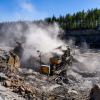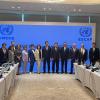News
Displaying Results 1 - 25 of 47
In an important move to secure the supply of essential raw materials, the European Critical Raw Materials Act (CRMA) entered into force on 23 May 2024. This legislation is a cornerstone in enhancing the EU's capabilities in sourcing, processing, and recycling critical raw materials (CRMs), which…
With its strong mining industry, mountainous areas and high seismic hazards, prevention and preparedness for disasters and climate change adaptation are high on Tajikistan’s agenda. In particular, the increasing frequency and severity of weather events due to climate change can undermine the safety…
Addressing the Tashkent International Investment Forum (2-3 May 2024), UNECE Executive Secretary Tatiana Molcean called for the mobilization of private sector investments to support the implementation of the Sustainable Development Goals (SDGs) and to foster regional cooperation in Central Asia.…
UNECE Resource Management Week 2024 spotlighted the growing roles of the United Nations Framework Classification for Resources (UNFC) and the United Nations Resource Management System (UNRMS) in promoting sustainable development through enhanced integration and effective management of natural…
Increasing the use of digital solutions including those developed by the United Nations Centre for Trade Facilitation and Electronic Business (UN/CEFACT) can enhance the sustainability and resilience of supply chains and strengthen global connectivity.
In a series of capacity-building activities…
Four years ago, when the COVID-19 pandemic hit, it disrupted the normal functioning of open markets. The ensuing crisis had crippling effects on global trade and productive capacities: it broke supply chains, reduced connectivity and slowed the flow of essential goods. Global food and energy…
The raw materials sector is at the forefront of global challenges and opportunities of the 21st century, as it plays a vital role in the energy, transport, and digital transitions required to mitigate and adapt to climate change. However, the sector also faces significant pressures from consumers,…
According to a recently published UNECE Policy Paper, the agrifood, the garment and footwear and the mineral sectors contribute significantly to the economic growth and employment in the UNECE region, while being major sources of global greenhouse gases (GHG) and environmental pollution. Evidence…
Transparency in the environmental performance of economic activities and effective public access to environmental information, especially on products, are indispensable in addressing pressing environmental challenges. This also supports a just transition towards a green and circular economy,…
UNECE support for the revision of the Georgian Mining Code Act is shaping the future of resource classification and estimation standards in Georgia. During a workshop in Tbilisi participants discussed how Georgian standards could play a crucial role in harmonizing with the global dimensions of the…
While underground coal mining in Albania stopped almost wholly (except for two private mines with a very insignificant output) more than 15 years ago, the abandonment of the mines from the 1990s onwards with no proper plans for closure has left a legacy of risks. These include water contamination,…
As the global economy emerges from the COVID-19 pandemic and governments strengthen efforts to “build-back-better”, trade as an engine of growth has re-emerged in policy agendas. For developing countries and countries with economies in transition that are still in the process of accession to the…
Momentum is growing on the digitalization of the Middle Corridor, linking the European Union and Asia, through Central Asia, the Caucasus, Türkiye and Eastern Europe, through the use of UNECE and UN/CEFACT standards for digitalization of multimodal data and document exchange.
Representatives of…
Mining is an important sector and economic contributor in Central Asian countries due to their rich mineral base. However, the mining activities also generate huge amount of waste which can contain hazardous substances and must be safely stored in so-called tailings management facilities (TMFs).…
Young professionals from industry, academia, and civil society came together to discuss and explore solutions for sustainable resource management at the UNECE Resource Management Week 2023. Hosted by the UNECE Resource Management Young Member Group (RMYMG), the highly interactive session provided a…
Uzbekistan is one of the world's largest producers of gold and uranium. In the last 40 years, Uzbekistan has built a strong mining industry, which is expected to grow in the years to come, given that only 20 % of the country’s territory has yet been explored. The expected rise in the number and…
In a move towards sustainable resource management, several countries have presented case studies of how the United Nations Framework Classification for Resources (UNFC) can scale-up harmonized resource management. UNFC provides a common language and standards for the classification of all energy…
Prevention of and preparedness for industrial accidents require special attention in Tajikistan, a country with a strong mining industry. The mountainous terrain of mining sites makes them highly susceptible to earthquakes, mudflows and floods, which can provoke Natech events (natural hazards…
This year marks the 30th anniversary of the UNECE Convention on the Transboundary Effects of Industrial Accidents. This unique international legal instrument, signed on 17 March 1992 and in force since 2000, helps to protect people and the environment from the devastating effects of industrial…
The global economy must be urgently steered away from unsustainable production and consumption patterns, which fuel the climate crisis, deplete natural resources and negatively impact both people and the environment. Global value chains are predominantly linear in nature, and the lack of…
Accidental water pollution, which can be sudden and heavy as a result of industrial accidents, endangers people and the environment where chemical activities take place near a river, lake or water body. Accidental water pollution events can be triggered by natural hazards, such as floods, lightning…
The United Nations Framework Classification for Resources (UNFC) is now published in Hungarian. This version, alongside recently published editions in Greek and Portuguese, will support policymakers to implement enhanced sustainable resource management in the UNECE region.
UNFC is universally…
Critical Raw Materials (CRMs) - such as lithium, nickel, copper, cobalt, manganese, graphite and rare earth elements - are essential to deliver on the Paris Agreement and Sustainable Development Goals (SDGs). In the build-up to COP27, UNECE and partners are mobilizing to address the challenges of…
Building resilient energy systems to address the ongoing global energy crisis will be top of the agenda of the upcoming Sustainable Energy Week (19-23 September). Representatives from UNECE's 56 member States will discuss how to ensure energy for optimal social, economic, and environmental…
Circular economy transformation is a new area of cooperation between the United Nations Economic Commission for Europe (UNECE) and the Government of Tajikistan. Under the overarching leadership of the Ministry of Economic Development and Trade, UNECE together with the UN Tajikistan, and in…

























